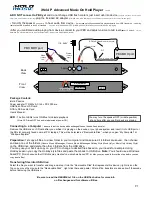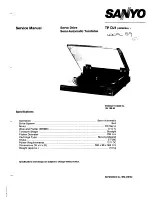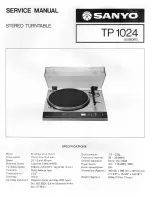
43
SAFETY INSTRUCTIONS
•
Read Instructions - All the safety and operating instructions should be read before the appliance is operated.
•
Retain Instructions - The safety and operating instructions should be retained for future reference.
•
Heed Warnings - All warnings on the appliance and in the operating instructions should be adhered to.
•
Follow Instructions - All operating and use instructions should be followed.
•
Water and Moisture - The appliance should not be used near water - for example, near a bathtub, washbowl,
kitchen sink, laundry tub, in a wet basement, or near a swimming pool, and the like.
•
Carts and Stands - The appliance should be used only with a cart or stand that is recommended by the
manufacturer.
An appliance and cart combination should be moved with care Quick stops, excessive force,
and uneven surfaces may cause the appliance and cart combination to overturn.
•
Wall or Ceiling Mounting - The appliance should be mounted to a wall or ceiling only as recommended by the
manufacturer.
•
Ventilation - The appliance should be situated so that its location or position does not interfere with its proper
ventilation. For example, the appliance should not be situated on a bed, sofa, rug, or similar surface that may
block the ventilation openings; or, placed in a built-in installation, such as a bookcase or cabinet that may
impede the flow of air through the ventilation openings
•
Heat - The appliance should be situated away from heat sources such as radiators, heat registers, stoves, or
other appliances (including amplifiers) that produce heat.
•
Power Sources - The appliance should be connected to a power supply only of the type described in the
operating instructions or as marked on the appliance.
•
Grounding or Polarization - Precautions should be taken so that the grounding or polarization means of an
appliance is not defeated.
•
Power-Cord Protection - Power-supply cords should be routed so that they are not likely to be walked on or
pinched by items placed upon or against them, paying particular attention to cords at plugs, convenience
receptacles, and the point where they exit from the appliance.
•
Cleaning - The appliance should be cleaned only as recommended by the manufacturer
Clean by wiping with a cloth slightly damp with water. Avoid getting water inside the appliance.
•
Disconnect power cord before servicing.
•
Replace critical components
only with factory parts or recommended equivalents.
•
For AC line powered units - Before returning repaired unit to user, use an ohmmeter to measure iron both AC
plug badges to all exposed metallic parts. The resistance should be more than 100,000ohms.
•
Nonuser Periods - The power cord of the appliance should be unplugged from the outlet when left unused for a
long period of time.
•
Object and Liquid Entry - Care should be taken so that objects do not fall and liquids are not spilled into the
enclosure through openings.
•
Damage Requiring Service - The appliance should be serviced by qualified service personnel when:
- The power-supply cord or the plug has been damaged; or
- Objects have fallen, or liquid has been spilled into the appliance; or
- The appliance has been exposed to rain; or
- The appliance does not appear to operate normally or exhibits a marked change in performance; or
- The appliance has been dropped, or the enclosure damaged
•
Servicing - The user should not attempt to service the appliance beyond that described in the operating
instructions. All other servicing should be referred to qualified service personnel.




























